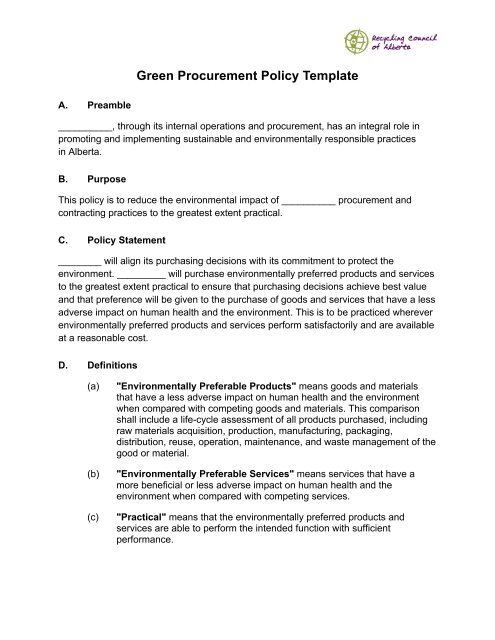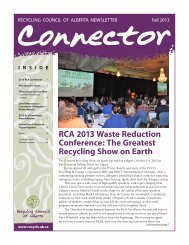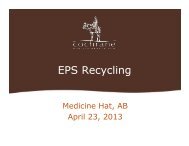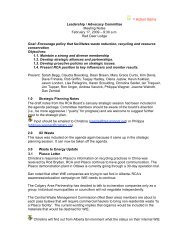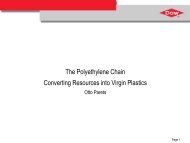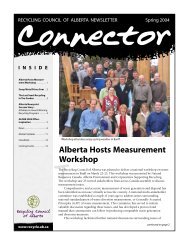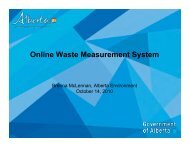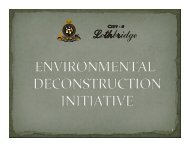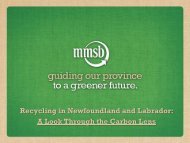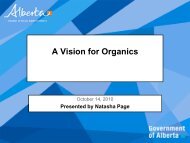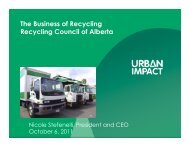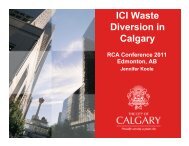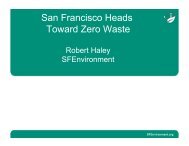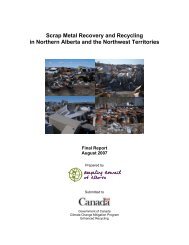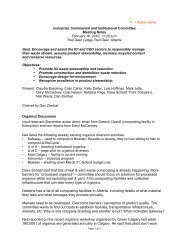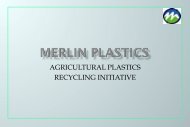Green Procurement Policy Template - Recycling Council of Alberta
Green Procurement Policy Template - Recycling Council of Alberta
Green Procurement Policy Template - Recycling Council of Alberta
You also want an ePaper? Increase the reach of your titles
YUMPU automatically turns print PDFs into web optimized ePapers that Google loves.
<strong>Green</strong> <strong>Procurement</strong> <strong>Policy</strong> <strong>Template</strong><br />
A. Preamble<br />
__________, through its internal operations and procurement, has an integral role in<br />
promoting and implementing sustainable and environmentally responsible practices<br />
in <strong>Alberta</strong>.<br />
B. Purpose<br />
This policy is to reduce the environmental impact <strong>of</strong> __________ procurement and<br />
contracting practices to the greatest extent practical.<br />
C. <strong>Policy</strong> Statement<br />
________ will align its purchasing decisions with its commitment to protect the<br />
environment. _________ will purchase environmentally preferred products and services<br />
to the greatest extent practical to ensure that purchasing decisions achieve best value<br />
and that preference will be given to the purchase <strong>of</strong> goods and services that have a less<br />
adverse impact on human health and the environment. This is to be practiced wherever<br />
environmentally preferred products and services perform satisfactorily and are available<br />
at a reasonable cost.<br />
D. Definitions<br />
(a)<br />
(b)<br />
(c)<br />
"Environmentally Preferable Products" means goods and materials<br />
that have a less adverse impact on human health and the environment<br />
when compared with competing goods and materials. This comparison<br />
shall include a life-cycle assessment <strong>of</strong> all products purchased, including<br />
raw materials acquisition, production, manufacturing, packaging,<br />
distribution, reuse, operation, maintenance, and waste management <strong>of</strong> the<br />
good or material.<br />
"Environmentally Preferable Services" means services that have a<br />
more beneficial or less adverse impact on human health and the<br />
environment when compared with competing services.<br />
"Practical" means that the environmentally preferred products and<br />
services are able to perform the intended function with sufficient<br />
performance.
<strong>Green</strong> <strong>Procurement</strong> <strong>Policy</strong> <strong>Template</strong> – developed by the <strong>Recycling</strong> <strong>Council</strong> <strong>of</strong> <strong>Alberta</strong><br />
Page 2 <strong>of</strong> 5<br />
(d)<br />
"Reasonable Cost" means that the environmentally preferred products<br />
and services are available for purchase at a price point which is no more<br />
than ____% higher than that <strong>of</strong> non-environmentally preferred products<br />
and services.<br />
E. Scope<br />
A. This policy will apply to the procurement <strong>of</strong> all products and services<br />
acquired by ____________.<br />
F. Implementation<br />
The “<strong>Green</strong> <strong>Procurement</strong> <strong>Policy</strong>” is intended for various categories <strong>of</strong> products and<br />
services. These may include, and not necessarily be limited to:<br />
- Paper and Paper Products<br />
- Office Supplies<br />
- Computer and Other Electronic Equipment and Supplies<br />
- Office and Other Furniture (including major appliances)<br />
- Vehicles and other transportation equipment<br />
- Food services and Catering<br />
- Consulting Services<br />
- Use <strong>of</strong> Hotels<br />
- Promotional Materials<br />
- Official Publications<br />
To assist with implementation, purchasers will work with suppliers to determine products<br />
and services that have a less adverse impact on human health and the environment.<br />
Appendix A includes certifications that should be used where possible when<br />
determining which environmentally-preferred products and services will be purchased.<br />
G. Guideline Review and Amendment<br />
The <strong>Green</strong> <strong>Procurement</strong> Guidelines will be regularly reviewed and amended to adapt to<br />
changing needs, circumstances and conditions to continue to be a progressive <strong>Green</strong><br />
<strong>Procurement</strong> <strong>Policy</strong>.
<strong>Green</strong> <strong>Procurement</strong> <strong>Policy</strong> <strong>Template</strong> – developed by the <strong>Recycling</strong> <strong>Council</strong> <strong>of</strong> <strong>Alberta</strong><br />
Page 3 <strong>of</strong> 5<br />
Appendix<br />
1. When developing this policy the following sources were used for information.<br />
(a)<br />
(b)<br />
(c)<br />
(d)<br />
(e)<br />
<strong>Alberta</strong> Environment <strong>Green</strong> <strong>Procurement</strong> <strong>Policy</strong><br />
Manitoba’s Sustainable Development <strong>Procurement</strong> Guidelines<br />
<strong>Recycling</strong> <strong>Council</strong> <strong>of</strong> <strong>Alberta</strong> <strong>Green</strong> <strong>Procurement</strong> Research<br />
(download report at<br />
http://www.recycle.ab.ca/images/stories/Download/RCA_<strong>Green</strong><strong>Procurement</strong>.pdf)<br />
Environmental Tools by the <strong>Alberta</strong> Ministry <strong>of</strong> Environment<br />
Steps You Can Take to <strong>Green</strong> Your <strong>Procurement</strong> by David Newman<br />
2. Guidelines <strong>Procurement</strong> Guidelines<br />
The following green procurement guidelines apply to _________ and shall be<br />
considered in any procurement.<br />
1. Conserving resources – which means<br />
(a) evaluating and reducing the need to purchase goods, materials and<br />
services;<br />
(b) purchasing goods, materials and services that use recycled products;<br />
(c) purchasing goods and materials with structures that require less material<br />
to manufacture;<br />
(d) purchasing goods and materials that require less packaging; and<br />
(e) reusing, recycling and recovering goods and materials.<br />
2. Conserving energy – which means<br />
(a) purchasing goods, materials and services where the consumption <strong>of</strong><br />
energy (electricity and fossil fuels) during production, transportation,<br />
usage and delivery is minimized;<br />
(b) purchasing goods, materials and services where renewable forms <strong>of</strong><br />
energy are substituted during production, transportation, usage and<br />
delivery for non-renewable forms <strong>of</strong> energy; and<br />
(c) purchasing and using goods, materials and services that have or use a<br />
structure that facilitate energy efficiency and resource conservation.<br />
3. Promoting pollution prevention, waste reduction and diversion –<br />
which means<br />
(a) purchasing goods and materials that are easy to recycle;<br />
(b) purchasing goods and materials with structures that facilitates<br />
disassembly for processing, recycling and waste management;
<strong>Green</strong> <strong>Procurement</strong> <strong>Policy</strong> <strong>Template</strong> – developed by the <strong>Recycling</strong> <strong>Council</strong> <strong>of</strong> <strong>Alberta</strong><br />
Page 4 <strong>of</strong> 5<br />
(c) purchasing goods and materials with packed with recycled products or<br />
materials that are recyclable;<br />
(d) purchasing goods and materials with a manufacturing process that avoids<br />
the creation <strong>of</strong> waste and pollutants at source;<br />
(a) purchasing goods and materials that are used or remanufactured;<br />
(b) purchasing services that minimize adverse environmental impacts;<br />
(c) purchasing goods and materials that have greater durability and longer<br />
life-span; and<br />
(d) using goods and materials in a manner that minimizes adverse<br />
environmental impacts.<br />
4. Protecting Human Health and Well-being- which means<br />
(a) Purchasing goods and services that have ethical standards in their<br />
manufacturing processes<br />
(e) where practicable, requiring the purchase <strong>of</strong> substitute or alternative<br />
goods, materials or services in place <strong>of</strong> goods or materials that may pose<br />
an elevated risk to human health, safety and the environment.<br />
Environmental Certification Programs:<br />
Eco-Logo<br />
EcoLogo is North America’s most widely<br />
recognized certification <strong>of</strong><br />
environmental products. EcoLogo has<br />
standards and certifies products in more<br />
than 120 categories.<br />
http://www.environmentalchoice.com/ <br />
Energy Star<br />
The international ENERGY STAR<br />
symbol is a simple way to identify<br />
products that are among the most<br />
energy-efficient on the market.<br />
http://oee.nrcan.gc.ca/energystar/
<strong>Green</strong> <strong>Procurement</strong> <strong>Policy</strong> <strong>Template</strong> – developed by the <strong>Recycling</strong> <strong>Council</strong> <strong>of</strong> <strong>Alberta</strong><br />
Page 5 <strong>of</strong> 5<br />
Hotel Association <strong>of</strong> Canada’s <strong>Green</strong> Key<br />
Eco-Rating Program:<br />
http://www.hacgreenhotels.com/home/default.asp<br />
The Hotel Association <strong>of</strong> Canada's<br />
(HAC) <strong>Green</strong> Key Eco-Rating<br />
Program is a rating system designed to<br />
recognize hotels, motels, and resorts<br />
that are committed to improving their<br />
fiscal and environmental performance.<br />
Ratings go from one key to five keys,<br />
where five keys is the highest<br />
environmentally responsible rating. A<br />
rating <strong>of</strong> three keys is the minimum<br />
requirement for use <strong>of</strong> a hotel.<br />
FSC<br />
FSC is an international certification and<br />
labeling system that guarantees that the<br />
forest products you purchase come<br />
from responsibly managed forests and<br />
verified recycled sources.<br />
www.fsc.rog <br />
ISO 14001<br />
ISO standard that exist to help<br />
organizations minimize how their<br />
operations negatively affect the<br />
environment (cause adverse changes to<br />
air, water, or land) and comply with<br />
applicable laws and regulations.<br />
About the <strong>Recycling</strong> <strong>Council</strong> <strong>of</strong> <strong>Alberta</strong><br />
The <strong>Recycling</strong> <strong>Council</strong> <strong>of</strong> <strong>Alberta</strong> (RCA) is a not-for-pr<strong>of</strong>it, non-political organization<br />
formed in 1987, and approved as an <strong>of</strong>ficial charity in 1995. The RCA's mission is to<br />
promote and facilitate waste reduction, recycling, and resource conservation in the<br />
Province <strong>of</strong> <strong>Alberta</strong>.<br />
For more information, and to become a member <strong>of</strong> the RCA, please visit<br />
www.recycle.ab.ca/membership.


